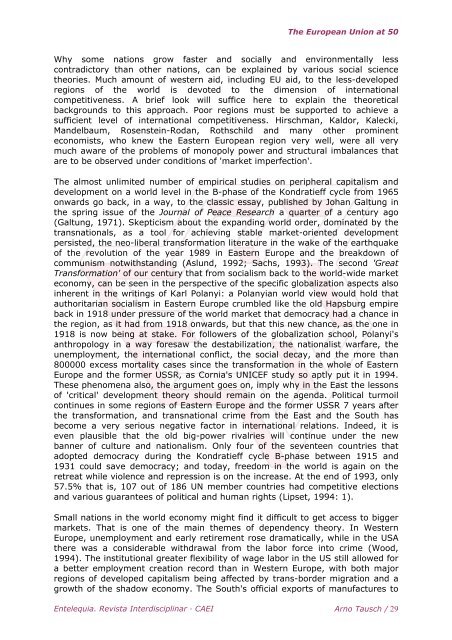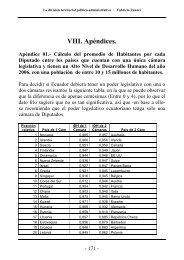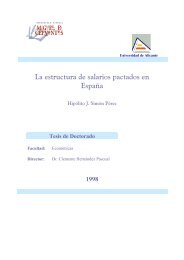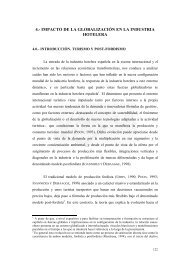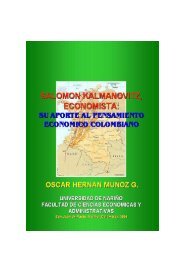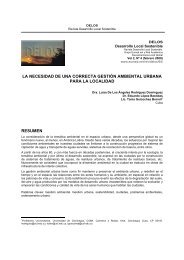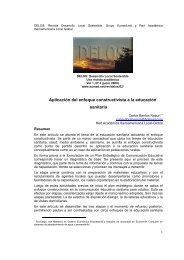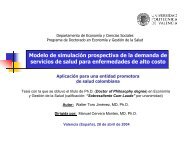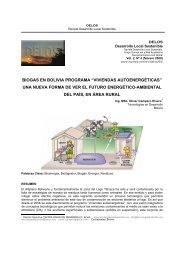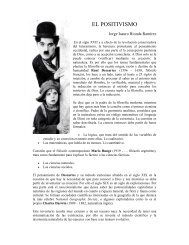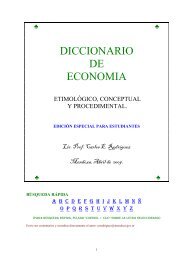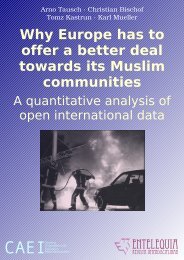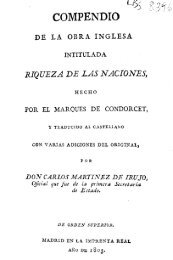Download the full book in PDF format - Eumed.net
Download the full book in PDF format - Eumed.net
Download the full book in PDF format - Eumed.net
You also want an ePaper? Increase the reach of your titles
YUMPU automatically turns print PDFs into web optimized ePapers that Google loves.
The European Union at 50<br />
Why some nations grow faster and socially and environmentally less<br />
contradictory than o<strong>the</strong>r nations, can be expla<strong>in</strong>ed by various social science<br />
<strong>the</strong>ories. Much amount of western aid, <strong>in</strong>clud<strong>in</strong>g EU aid, to <strong>the</strong> less-developed<br />
regions of <strong>the</strong> world is devoted to <strong>the</strong> dimension of <strong>in</strong>ternational<br />
competitiveness. A brief look will suffice here to expla<strong>in</strong> <strong>the</strong> <strong>the</strong>oretical<br />
backgrounds to this approach. Poor regions must be supported to achieve a<br />
sufficient level of <strong>in</strong>ternational competitiveness. Hirschman, Kaldor, Kalecki,<br />
Mandelbaum, Rosenste<strong>in</strong>-Rodan, Rothschild and many o<strong>the</strong>r prom<strong>in</strong>ent<br />
economists, who knew <strong>the</strong> Eastern European region very well, were all very<br />
much aware of <strong>the</strong> problems of monopoly power and structural imbalances that<br />
are to be observed under conditions of 'market imperfection'.<br />
The almost unlimited number of empirical studies on peripheral capitalism and<br />
development on a world level <strong>in</strong> <strong>the</strong> B-phase of <strong>the</strong> Kondratieff cycle from 1965<br />
onwards go back, <strong>in</strong> a way, to <strong>the</strong> classic essay, published by Johan Galtung <strong>in</strong><br />
<strong>the</strong> spr<strong>in</strong>g issue of <strong>the</strong> Journal of Peace Research a quarter of a century ago<br />
(Galtung, 1971). Skepticism about <strong>the</strong> expand<strong>in</strong>g world order, dom<strong>in</strong>ated by <strong>the</strong><br />
transnationals, as a tool for achiev<strong>in</strong>g stable market-oriented development<br />
persisted, <strong>the</strong> neo-liberal trans<strong>format</strong>ion literature <strong>in</strong> <strong>the</strong> wake of <strong>the</strong> earthquake<br />
of <strong>the</strong> revolution of <strong>the</strong> year 1989 <strong>in</strong> Eastern Europe and <strong>the</strong> breakdown of<br />
communism notwithstand<strong>in</strong>g (Aslund, 1992; Sachs, 1993). The second 'Great<br />
Trans<strong>format</strong>ion' of our century that from socialism back to <strong>the</strong> world-wide market<br />
economy, can be seen <strong>in</strong> <strong>the</strong> perspective of <strong>the</strong> specific globalization aspects also<br />
<strong>in</strong>herent <strong>in</strong> <strong>the</strong> writ<strong>in</strong>gs of Karl Polanyi: a Polanyian world view would hold that<br />
authoritarian socialism <strong>in</strong> Eastern Europe crumbled like <strong>the</strong> old Hapsburg empire<br />
back <strong>in</strong> 1918 under pressure of <strong>the</strong> world market that democracy had a chance <strong>in</strong><br />
<strong>the</strong> region, as it had from 1918 onwards, but that this new chance, as <strong>the</strong> one <strong>in</strong><br />
1918 is now be<strong>in</strong>g at stake. For followers of <strong>the</strong> globalization school, Polanyi's<br />
anthropology <strong>in</strong> a way foresaw <strong>the</strong> destabilization, <strong>the</strong> nationalist warfare, <strong>the</strong><br />
unemployment, <strong>the</strong> <strong>in</strong>ternational conflict, <strong>the</strong> social decay, and <strong>the</strong> more than<br />
800000 excess mortality cases s<strong>in</strong>ce <strong>the</strong> trans<strong>format</strong>ion <strong>in</strong> <strong>the</strong> whole of Eastern<br />
Europe and <strong>the</strong> former USSR, as Cornia's UNICEF study so aptly put it <strong>in</strong> 1994.<br />
These phenomena also, <strong>the</strong> argument goes on, imply why <strong>in</strong> <strong>the</strong> East <strong>the</strong> lessons<br />
of 'critical' development <strong>the</strong>ory should rema<strong>in</strong> on <strong>the</strong> agenda. Political turmoil<br />
cont<strong>in</strong>ues <strong>in</strong> some regions of Eastern Europe and <strong>the</strong> former USSR 7 years after<br />
<strong>the</strong> trans<strong>format</strong>ion, and transnational crime from <strong>the</strong> East and <strong>the</strong> South has<br />
become a very serious negative factor <strong>in</strong> <strong>in</strong>ternational relations. Indeed, it is<br />
even plausible that <strong>the</strong> old big-power rivalries will cont<strong>in</strong>ue under <strong>the</strong> new<br />
banner of culture and nationalism. Only four of <strong>the</strong> seventeen countries that<br />
adopted democracy dur<strong>in</strong>g <strong>the</strong> Kondratieff cycle B-phase between 1915 and<br />
1931 could save democracy; and today, freedom <strong>in</strong> <strong>the</strong> world is aga<strong>in</strong> on <strong>the</strong><br />
retreat while violence and repression is on <strong>the</strong> <strong>in</strong>crease. At <strong>the</strong> end of 1993, only<br />
57.5% that is, 107 out of 186 UN member countries had competitive elections<br />
and various guarantees of political and human rights (Lipset, 1994: 1).<br />
Small nations <strong>in</strong> <strong>the</strong> world economy might f<strong>in</strong>d it difficult to get access to bigger<br />
markets. That is one of <strong>the</strong> ma<strong>in</strong> <strong>the</strong>mes of dependency <strong>the</strong>ory. In Western<br />
Europe, unemployment and early retirement rose dramatically, while <strong>in</strong> <strong>the</strong> USA<br />
<strong>the</strong>re was a considerable withdrawal from <strong>the</strong> labor force <strong>in</strong>to crime (Wood,<br />
1994). The <strong>in</strong>stitutional greater flexibility of wage labor <strong>in</strong> <strong>the</strong> US still allowed for<br />
a better employment creation record than <strong>in</strong> Western Europe, with both major<br />
regions of developed capitalism be<strong>in</strong>g affected by trans-border migration and a<br />
growth of <strong>the</strong> shadow economy. The South's official exports of manufactures to<br />
Entelequia. Revista Interdiscipl<strong>in</strong>ar · CAEI Arno Tausch / 29


